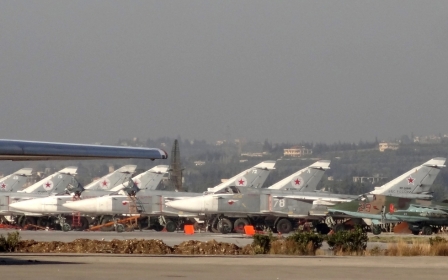Idlib air strike kills at least 58 as government approves Syria truce plan

At least 58 people were reported killed and dozens wounded in a Saturday air attack on a vegetable market in the city of Idlib, hours after the United States and Russia hailed a breakthrough deal to put Syria's peace process back on track.
Syria's government approved the ceasefire deal but the main opposition group was more cautious.
Syrian state news agency SANA reported that the "government has approved the agreement, and a cessation of hostilities will begin in Aleppo for humanitarian reasons".
The opposition High Negotiations Committee said it had yet to receive the deal's official text. "We saw the agreement via the media - we must receive an official copy," HNC spokesman Salem al-Meslet wrote on Twitter.
Leading HNC member Bassma Kodmani said her group "cautiously welcomed" the deal but was sceptical Damascus would comply.
The Syrian Observatory for Human Rights said the dead in Idlib included 13 women and 13 children, but it was not immediately clear how many civilians were among the remaining victims.
The monitor said dozens more were wounded in the strikes, warning that the death toll could rise even further.
It could not identify who carried out the strikes, but the Syrian government and its ally Russia have regularly conducted raids in Idlib province.
"People were shopping before the (Muslim feast of) Eid al-Adha next week, which is why the toll is so high," said Observatory head Rami Abdel Rahman.
Two civil defence workers told the Reuters news agency that bodies were still being pulled out of the rubble of collapsed buildings.
One resident and rescue workers said they thought the jets were Russian, as they flew at high altitude, unlike Syrian helicopters that hit at lower altitudes.
The claim could not be independently verified.
The attack came hours after the United States and Russia announced a deal in the early hours of Saturday including a nationwide ceasefire effective from sundown on Monday.
Washington said indiscriminate bombing of civilians by the Syrian army must end.
But the Idlib attack places serious strain on the prospect of a full cessation of hostilities within two days.
The Syrian army meanwhile attacked rebel-held areas of Aleppo, pushing to maximise recent gains before the ceasefire was due to come into effect on Monday.
Rebels said they were planning a counter offensive.
The army and pro-government militias pushed from the city's Ramousah area towards rebel pockets in the Amriyah district, both sides said.
"The fighting is flaring on all the fronts of southern Aleppo, but the clashes in Amiryah are the heaviest," said Captain Abdul Salam Abdul Razak, the military spokesman of the rebel Nour al-Din al-Zinki Brigades.
Recent government gains in Ramousah have reopened the main route into the government-held west, and let forces backing President Bashar al-Assad encircle the city's rebel-held east.
An MEE correspondent inside Aleppo reported "many air raids" in the city on Saturday, including in Bustan al-Qasr, al-Ferdous and Mashhad. He said there were at least 30 casualties, including two dead.
Ceasefire on Monday
The violence were a serious blow to US efforts to end the fighting with its new plan, which US Secretary of State John Kerry said was "an arrangement we think has the capability of sticking".
Standing by his Russian counterpart, Sergei Lavrov, after a day of talks in Geneva, Kerry said he believed the plan would lead to talks to "stop the conflict".
He said the agreement would prevent the air forces of Assad from flying combat missions anywhere that the opposition was present, calling this provision the "bedrock of the agreement" and labeling Assad's air force the "main driver of civilian casualties" and migrant flows.
"That should put an end to the barrel bombs, an end to the indiscriminate bombing of civilian neighbourhoods," Kerry said.
He said the truce would come into force on Monday, the first day of the Muslim holiday of Eid al-Adha, and that if it holds for seven days the US would begin cooperation with Russian forces in targetting militants of the the Nusra Front and Islamic State group.
"Going after Nusra is not a concession to anybody, it is profoundly in the interest of the United States to target al-Qaeda," he said.
"If groups within the legitimate opposition want to retain their legitimacy, they need to distance themselves in every way possible from Nusra and Daesh."
Lavrov said that despite continuing mistrust, the two sides had developed five documents that would enable coordination of the fight against terrorism and a revival of Syria's failed truce in an enhanced form.
"This all creates the necessary conditions for resumption of the political process which has been stalling for a long time," Lavrov said on Friday.
He said Moscow could not "100 percent guarantee" that all the parties would obey the ceasefire.
"The Syrian government has been informed by us about these arrangements, and it is ready to fulfil them," he added.
The HNC, the main opposition political bloc in Syria, said on Saturday that it welcomed the deal "if it is going to be enforced".
The onus was on Russia as its influence "was the only way to get the regime to comply," a statement added.
Turkey has also welcomed the truce. "We welcome the agreement," the Turkish foreign ministry said in a statement, adding that it was essential that fighting was halted across Syria and humanitarian aid reaches those in need "from the first day" of the ceasefire.
This article is available in French on Middle East Eye French edition.
Stay informed with MEE's newsletters
Sign up to get the latest alerts, insights and analysis, starting with Turkey Unpacked
Middle East Eye delivers independent and unrivalled coverage and analysis of the Middle East, North Africa and beyond. To learn more about republishing this content and the associated fees, please fill out this form. More about MEE can be found here.





